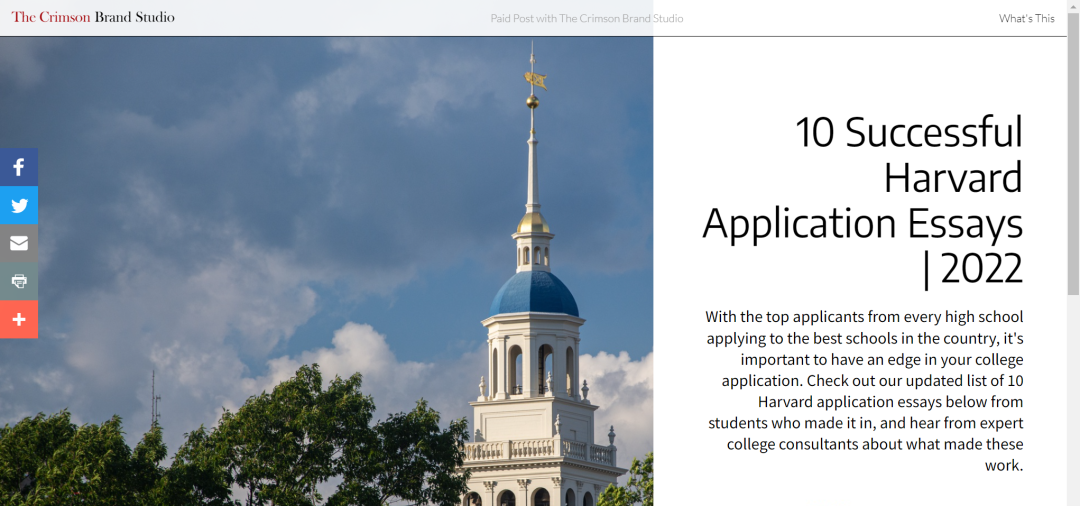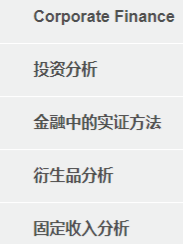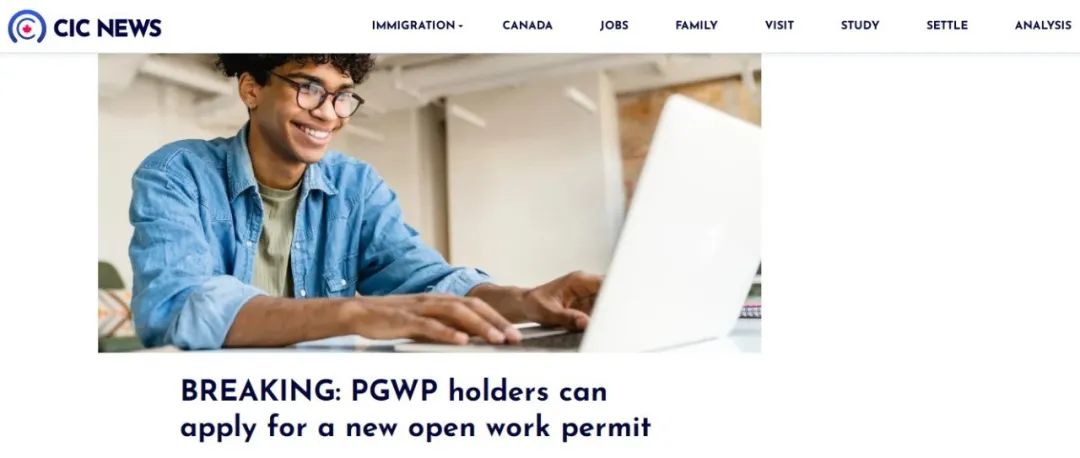文章目录[隐藏]
8/1common App和UC系统的开放后,申请季的同学们陆续进入文书准备阶段,同时这两天哈佛校报也公布了2022年最新录取哈佛的十篇优秀文书,值得提醒大家的是文书头脑风暴前了解清楚每个学校的招生偏好,明白招生官希望从文书中了解哪些申请人的信息才是文书准备正确的打开方式。
下面一起来看下能在哈佛大学脱颖而出的文书,以及哈耶普斯麻宾大等名校的录取偏好。
Successful Harvard Essay
Michelle G.'s Essay
Red, orange, purple, gold...I was caught in a riot of shifting colors. I pranced up and down the hill, my palms extended to the moving collage of butterflies that surrounded me. “Would you like to learn how to catch one?” Grandfather asked, holding out a glass jar. “Yes!” I cheered, his huge calloused fingers closing my chubby five-year-old hands around it carefully.
Grandfather put his finger to his lips, and I obliged as I watched him deftly maneuver his net. He caught one marvelous butterfly perched on a flower, and I clutched the open jar in anticipation as he slid the butterfly inside. It quivered and fell to the bottom of the jar, and I gasped. It struggled until its wings, ablaze in a glory of orange and red, quivered to a stop. I watched, wide-eyed, as it stopped moving. “Grandpa! What’s happening?”
They were not meant to live forever: their purpose was to flame brilliantly and then fade away. Thus, his art serves as a memory of their beauty, an acknowledgement of nature's ephemeral splendor.
My grandfather had always had a collection of butterflies, but that was the first time I saw him catch one. After witnessing the first butterfly die, I begged him to keep them alive; I even secretly let some of them go. Therefore, to compromise, he began carrying a special jar for the days I accompanied him on his outings, a jar to keep the living butterflies. But the creatures we caught always weakened and died after a few days in captivity, no matter how tenderly I fed and cared for them. Grandfather took me aside and explained that the lifespan of an adult butterfly was very short. They were not meant to live forever: their purpose was to flame brilliantly and then fade away. Thus, his art serves as a memory of their beauty, an acknowledgement of nature’s ephemeral splendor.
But nothing could stay the same. I moved to America and as the weekly excursions to the mountainside ended, so did our lessons in nature and science. Although six thousand miles away, I would never forget how my grandpa’s wrinkles creased when he smiled or how he always smelled like mountain flowers.
As I grew older and slowly understood how Grandfather lived his life, I began to follow in his footsteps. He protected nature’s beauty from decay with his art, and in the same way, I tried to protect my relationships, my artwork, and my memories. I surrounded myself with the journals we wrote together, but this time I recorded my own accomplishments, hoping to one day show him what I had done. I recorded everything, from the first time I spent a week away from home to the time I received a gold medal at the top of the podium at the California Tae Kwon Do Competition. I filled my new home in America with the photographs from my childhood and began to create art of my own. Instead of catching butterflies like my grandpa, I began experimenting with butterfly wing art as my way of preserving nature’s beauty. Soon my home in America became a replica of my home in China, filled from wall to wall with pictures and memories.
Nine long years passed before I was reunited with him. The robust man who once chased me up the hillside had developed arthritis, and his thick black hair had turned white. The grandfather I saw now was not the one I knew; we had no hobby and no history in common, and he became another adult, distant and unapproachable. With this, I forgot all about the journals and photos that I had kept and wanted to share with him.
After weeks of avoidance, I gathered my courage and sat with him once again. This time, I carried a large, leather-bound book with me. “Grandfather,” I began, and held out the first of my many journals. These were my early days in America, chronicled through pictures, art, and neatly-printed English. On the last page was a photograph of me and my grandfather, a net in his hand and a jar in mine. As I saw our faces, shining with proud smiles, I began to remember our days on the mountainside, catching butterflies and halting nature’s eventual decay.
My grandfather has weakened over the years, but he is still the wise man who raised me and taught me the value of capturing the beauty of life. Although he has grown old, I have grown up. His legs are weak, but his hands are still as gentle as ever. Therefore, this time, it will be different. This time, I will no longer recollect memories, but create new ones.
Homeless for Thirteen Years
Eda's Essay
I sat on my parents’ bed weeping with my head resting on my knees. “Why did you have to do that to me? Why did you have to show me the house and then take it away from me?” Hopelessly, I found myself praying to God realizing it was my last resort.
For years, my family and I found ourselves moving from country to country in hopes of a better future. Factors, such as war and lack of academic opportunities, led my parents to pack their bags and embark on a new journey for our family around the world. Our arduous journey first began in Kuçovë, Albania, then Athens, Greece, and then eventually, Boston, Massachusetts. Throughout those years, although my family always had a roof over our heads, I never had a place I could call “home.”
That night that I prayed to God, my mind raced back to the night I was clicking the delete button on my e-mails, but suddenly stopped when I came upon a listing of the house. It was September 22, 2007 —eight years exactly to the day that my family and I had moved to the United States. Instantly, I knew that it was fate that was bringing this house to me. I remembered visiting that yellow house the next day with my parents and falling in love with it. However, I also remembered the heartbreaking phone call I received later on that week saying that the owners had chosen another family’s offer.
A week after I had prayed to God, I had given up any hopes of my family buying the house. One day after school, I unlocked the door to our one-bedroom apartment and walked over to the telephone only to see it flashing a red light. I clicked PLAY and unexpectedly heard the voice of our real estate agent. “Eda!” she said joyfully. “The deal fell through with the other family—the house is yours! Call me back immediately to get started on the papers.” For a moment, I stood agape and kept replaying the words in my head. Was this really happening to me? Was my dream of owning a home finally coming true?
Over the month of November, I spent my days going to school and immediately rushing home to make phone calls. Although my parents were not fluent enough in English to communicate with the bank and real estate agent, I knew that I was not going to allow this obstacle to hinder my dream of helping to purchase a home for my family. Thus, unlike a typical thirteen-year-old girl’s conversations, my phone calls did not involve the mention of makeup, shoes, or boys. Instead, my conversations were composed of terms, such as “fixed-rate mortgages,” “preapprovals,” and “down payments.” Nevertheless, I was determined to help purchase this home after thirteen years of feeling embarrassed from living in a one-bedroom apartment. No longer was I going to experience feelings of humiliation from not being able to host sleepovers with my friends or from not being able to gossip with girls in school about who had the prettiest room color.
I had been homeless for the first thirteen years of my life. Although I will never be able to fully repay my parents for all of their sacrifices, the least I could do was to help find them a home that they could call their own—and that year, I did. To me, a home means more than the general conception of “four walls and a roof.” A home is a place filled with memories and laughter from my family. No matter where my future may lead me, I know that if at times I feel alone, I will always have a yellow home with my family inside waiting for me.
Playing it Dangerous
Lisa's Essay
In hazy stillness, a sudden flurry of colored skirts, whispers of “Merde!” Sternly, my fingers smooth back my hair, although they know no loose strands will be found. My skin absorbs heat from stage lights above—if only that heat would seep into my brain, denature some proteins, and deactivate the neurons stressing me out. A warm hand, accompanied by an even warmer smile, interrupts my frenzied solitude. I glance up. My lovely teacher nods, coaxing my frozen lips into a thawed smile. A complex figure, filled in with doubt, yet finished with shades of confidence: My body takes its place and waits.
One, two, three, four; two, two, three, four. On stage, the lights and music wash over me. Never having had a true ballet solo before, my lungs are one breath away from hyperventilating. Trying to achieve a Zen-like state, I imagine a field of daisies, yet my palms continue sweating disobediently. It’s not that I’ve never been on stage alone before; I’ve had plenty of piano recitals and competitions. Yet, while both performances consume my mind and soul, ballet demands complete commitment of my body.
Gently slide into arabesque and lean downward; try not to fall flat on face—Mom’s videotaping. In terms of mentality, I would hardly be described as an introvert; yet, a fear of failure has still kept me from taking risks. Maybe I was scared of leaping too high, falling too far, and hitting the hard floor. As I moved up in the cutthroat world of dance, this fear only increased; the pressure of greater expectations and the specter of greater embarrassment had held me contained. Now, every single eyeball is on me.
Lean extra in this pirouette; it’s more aesthetic. But is it always better to be safe than sorry? Glancing toward the wings, I see my teacher’s wild gesticulations: Stretch your arms out, she seems to mime, More! A genuine smile replaces one of forced enthusiasm; alone on the stage, this is my chance to shine. I breathe in the movements, forget each individual step. More than just imagining, but finally experiencing the jubilation of the music, I allow my splits to stretch across the stage and my steps to extend longer and longer, until I’m no longer safe and my heart is racing. Exhilarated and scared in the best way, I throw myself into my jumps. I no longer need to imagine scenes to get in the mood; the emotions are twirling and leaping within me.
Reaching, stretching, grabbing, flinging ... My fear no longer shields me. I find my old passion for ballet, and remember the grace and poise that can nevertheless convey every color of emotion. Playing it safe will leave me part of the backdrop; only by taking risks can I step into the limelight. Maybe I’ll fall, but the rush is worth it. I’ll captain an all-male science bowl team, run a marathon, audition for a musical, and embrace the physical and intellectual elation of taking risks.
Successful Harvard Essay
Yueming's Essay
My Ye-Ye always wears a red baseball cap. I think he likes the vivid color—bright and sanguine, like himself. When Ye-Ye came from China to visit us seven years ago, he brought his red cap with him and every night for six months, it sat on the stairway railing post of my house, waiting to be loyally placed back on Ye-Ye’s head the next morning. He wore the cap everywhere: around the house, where he performed magic tricks with it to make my little brother laugh; to the corner store, where he bought me popsicles before using his hat to wipe the beads of summer sweat off my neck. Today whenever I see a red hat, I think of my Ye-Ye and his baseball cap, and I smile.
Ye-Ye is the Mandarin word for “grandfather.” My Ye-Ye is a simple, ordinary person—not rich, not “successful”—but he is my greatest source of inspiration and I idolize him. Of all the people I know, Ye-Ye has encountered the most hardship and of all the people I know, Ye-Ye is the most joyful. That these two aspects can coexist in one individual is, in my mind, truly remarkable.
Ye-Ye was an orphan. Both his parents died before he was six years old, leaving him and his older brother with no home and no family. When other children gathered to read around stoves at school, Ye-Ye and his brother walked in the bitter cold along railroad tracks, looking for used coal to sell. When other children ran home to loving parents, Ye-Ye and his brother walked along the streets looking for somewhere to sleep. Eight years later, Ye-Ye walked alone—his brother was dead.
Ye-Ye managed to survive, and in the meanwhile taught himself to read, write, and do arithmetic. Life was a blessing, he told those around him with a smile.
Years later, Ye-Ye’s job sent him to the Gobi Desert, where he and his fellow workers labored for twelve hours a day. The desert wind was merciless; it would snatch their tent in the middle of the night and leave them without supply the next morning. Every year, harsh weather took the lives of some fellow workers.
After eight years, Ye-Ye was transferred back to the city where his wife lay sick in bed. At the end of a twelve-hour workday, Ye-Ye took care of his sick wife and three young children. He sat with the children and told them about the wide, starry desert sky and mysterious desert lives. Life was a blessing, he told them with a smile.
But life was not easy; there was barely enough money to keep the family from starving. Yet, my dad and his sisters loved going with Ye-Ye to the market. He would buy them little luxuries that their mother would never indulge them in: a small bag of sunflower seeds for two cents, a candy each for three cents. Luxuries as they were, Ye-Ye bought them without hesitation. Anything that could put a smile on the children’s faces and a skip in their steps was priceless.
Ye-Ye still goes to the market today. At the age of seventy-eight, he bikes several kilometers each week to buy bags of fresh fruits and vegetables, and then bikes home to share them with his neighbors. He keeps a small patch of strawberries and an apricot tree. When the fruit is ripe, he opens his gate and invites all the children in to pick and eat. He is Ye-Ye to every child in the neighborhood.
I had always thought that I was sensible and self-aware. But nothing has made me stare as hard in the mirror as I did after learning about the cruel past that Ye-Ye had suffered and the cheerful attitude he had kept throughout those years. I thought back to all the times when I had gotten upset. My mom forgot to pick me up from the bus station. My computer crashed the day before an assignment was due. They seemed so trivial and childish, and I felt deeply ashamed of myself.
Now, whenever I encounter an obstacle that seems overwhelming, I think of Ye-Ye; I see him in his red baseball cap, smiling at me. Like a splash of cool water, his smile rouses me from grief, and reminds me how trivial my worries are and how generous life has been. Today I keep a red baseball cap at the railing post at home where Ye-Ye used to put his every night. Whenever I see the cap, I think of my Ye-Ye, smiling in his red baseball cap, and I smile. Yes, Ye-Ye. Life is a blessing.
Successful Harvard Essay
Charles' Essay
James was not fitting in with everyone else. During lunch, he sat alone, playing with his own toys. During group activities, the other campers always complained when paired with him. What was wrong? As camp counselor, I quietly observed his behavior—nothing out of the ordinary. I just couldn’t fathom why the other campers treated him like a pariah.
After three days of ostracism, James broke down during a game of soccer. Tears streaming down his cheeks, he slumped off the field, head in his hands. I jogged toward him, my forehead creased with concern. Some campers loudly remarked, “Why is that creep crying?” Furious indignation leaped into my heart. They were the ones who “accidentally” bumped into him and called him “James the Freak.” It was their cruelty that caused his meltdown, and now they were mocking him for it. I sharply told them to keep their thoughts to themselves. I squatted beside James and asked him what was wrong. Grunting, he turned his back to me. I had to stop his tears, and I had to make him feel comfortable. So for the next hour, I talked about everything a seven-year-old boy might find interesting, from sports to Transformers.
“I have a question,” I asked as James began to warm to me. I took a deep breath and dove right into the problem. “Why do the other campers exclude you?” Hesitantly, he took off his shoes and socks, and pointed at his left foot. One, two, three … four. He had four toes. We had gone swimming two days before: All the campers must have noticed. I remembered my childhood, when even the smallest abnormality—a bad haircut, a missing tooth—could cause others, including myself, to shrink away. I finally understood.
But what could I do to help? I scoured my mind for the words to settle his demons. But nothing came to me. Impulsively, I hugged him—a gesture of intimacy we camp leaders were encouraged not to initiate, and an act I later discovered no friend had ever offered James before. Then, I put my hand on his shoulder and looked him straight in the eyes. I assured him that external features didn’t matter, and that as long as he was friendly, people would eventually come around. I listed successful individuals who had not been hindered by their abnormalities. And finally, I told him he would always be my favorite camper, regardless of whether he had two, five, or a hundred toes.
On the last day of camp, I was jubilant—James was starting to fit in. Although the teasing had not completely disappeared, James was speaking up and making friends. And when, as we were saying our good-byes, James gave me one last hug and proclaimed that I was his “bestest friend in the whole wide world,” my heart swelled up. From my campers, I learned that working with children is simply awesome. And from James, I learned that a little love truly goes a long way.
Successful Harvard Essay: Yukta
Yukta's Essay
Garishly lined with a pearlescent lavender, my eyes idly scanned the haphazard desk in front of me, settling on a small kohl. I packed the ebony powder into my waterline with a shaky hand, wincing at the fine specks making their way into my eyes.
The girl in the mirror seemed sharper, older, somehow. At only 12, I was relatively new to the powders and blushes that lined my birthday makeup kit, but I was determined to decipher the deep splashes of color that had for so long been an enigma to me.
After school involved self-inflicted solitary confinement, as I shut myself in my bedroom to hone my skills. The palette’s colors bore in, the breadth of my imagination interwoven into now-brittle brushes. Much to my chagrin, my mom walked in one day, amused at my smudged lipstick, which congealed on the wispy hairs that lined my upper lip.
“Halloween already?” she asked playfully.
I flushed in embarrassment as she got to work, smoothing my skin with a brush and filling the gaps in my squiggly liner. Becoming a makeup aficionado was going to take some help.
“What’s this even made of?” I asked, transfixed by the bright powder she was smattering on my cheeks.
“You know, I’m not sure,” she murmured. “Maybe you should find out.”
I did.
Hours down the internet rabbit hole, I learned that the shimmery powder was made of mica, a mineral commonly used in cosmetics. While the substance was dazzling, its production process was steeped in humanitarian violations and environmental damage. Determined to reconcile my burgeoning love for makeup with my core values, I flung the kit into the corner of my drawer, vowing to find a more sustainable alternative. Yes, I was every bit as dramatic as you imagine it.
Now 17, I approach ethical makeup with assured deliberation. As I glance at my dusty kit, which still sits where I left it, I harken back on the journey it has taken me on. Without the reckoning that it spurred, makeup would still simply be a tool of physical transformation, rather than a catalyst of personal growth.
Now, each swipe of eyeliner is a stroke of my pen across paper as I write a children’s book about conscious consumerism. My flitting fingers programmatically place sparkles, mattes, and tints across my face in the same way that they feverishly move across a keyboard, watching algorithms and graphs integrate into models of supply chain transparency. Makeup has taught me to be unflinching, both in self expression and my expectations for the future. I coat my lips with a bold sheen, preparing them to form words of unequivocal urgency at global conferences and casual discussions. I see my passion take flight, emboldening others to approach their own reckonings, uncomfortable as they may be. I embark on a two-year journey of not buying new clothes in a statement against mass consumption and rally youth into a unified organization. We stand together, picking at the gritty knots of makeup, corporate accountability, and sustainability as they slowly unravel.
I’m not sure why makeup transfixes me. Perhaps it’s because I enjoy seeing my reveries take shape. Yukta, the wannabe Wicked Witch of the West, has lids coated with emerald luster and lips of coal. Yukta, the Indian classical dancer, wields thick eyeliner and bright crimson lipstick that allow her expressions to be amplified across a stage. Deep rooted journeys of triumph and tribulation are plastered across the surface of my skin — this paradox excites me.
Perhaps I am also drawn to makeup because as I peel back the layers, I am still wholly me. I am still the young girl staring wide-eyed at her reflection, earnestly questioning in an attempt to learn more about the world. Most importantly, I still carry an unflagging vigor to coalesce creativity and activism into palpable change, one brushstroke at a time.
Successful Harvard Essay
Michelle C.'s Essay
“You should scrub off the top layer of your skin whenever you lose a round,” my debate teammate once advised me.
“That’s not practical,” I replied.
“Neither is your refusal to wear clothes you’ve lost important debate rounds in. Your wardrobe has very little to do with your success.”
Half of me disagrees with him. I still bring three BIC Round Stic pencils with 0.7 lead to every test because my gut tells me this fastidious procedure raises my scores. I’m still convinced that labs receive better grades if written in Calibri. And I still won’t rewear clothes in which I’ve lost crucial rounds.
Yet the other half of me is equally dismissive of my own superstitions. I love logic, never failing to check that steps in a proof lead to a precise conclusion without gaps in reasoning.
Fortunately, I often abandon my penchant for pragmatism to accommodate for my unwarranted superstitions. And since I only feel the need to act logicalcally in selective situations, I am perfectly content with the illogical nature of my other habits:
Raised with my great-grandmother, grandparents, and parents all under one roof, I never lacked a consultant to help me transcribe Korean holiday dates from the lunar calendar onto my schedule. Yet whenever all four generations of my family celebrates with a traditional meal of bulgogi, my untraceable and admittedly nonexistent Italian blood flares in protest; I rebelliously cook myself linguine con le vongole that clashes terribly with my mom’s pungent kimchi.
If I plot a graph of “hours I spend in physical activity” versus “week of the year,” the result looks like an irregular cardiac cycle. The upsurges symbolize my battles with colossal walls of water in hopes of catching a smooth surf back to Mission Bay shore. The ensuing period of rest mirrors the hours I spend researching in that one spot in my debate team’s war room that isn’t covered in papers (yet), or at the piano sight-reading the newest Adele song. Then the diastolic tranquility is interrupted by the weekends when I’m sprinting through trenches to avoid paintballs swarming above my favorite arena at Paintball USA.
I find comfort in the familiar. I treasure the regular midnight chats with my brother as we indulge in batter while baking cupcakes for a friend’s birthday, keeping our voices hushed to avoid waking our mom and facing her “salmonella is in your near future” lecture. Yet, some of my fondest memories involve talking to people with whom I share nothing in common. Whether my conversations are about the Qatari coach’s research on Kuwait’s female voting patterns, or about the infinite differences between the “common app” and the Oxford interviewing process, or even about my friend’s Swedish school’s peculiar policy of mandating uniforms only on Wednesdays, I love comparing cultures with debaters from different countries.
My behavior is unpredictable. Yet it’s predictably unpredictable. Sure, I’ll never eat a Korean dinner like one might expect. But I’ll always be cooking linguine the moment I catch a whiff of kimchi.
More Boluses to Dissect
Taras' Essay
Finally, I had found a volunteer opportunity at the Long Marine Lab, a marine biology research facility at UC Santa Cruz! I envisioned swimming with dolphins, or perhaps studying behavioral patterns of decorator crabs. But when I discovered the nature of my work on the first day of volunteering, my excitement turned to disappointment: I’d be picking through albatross boluses, the indigestible materials they cough up before going to sea. Sure enough, after three hours of separating fishing line from brown muck, I began to dread what I was in for. At that point, I had no clue of just how interesting the opportunity would turn out to be, and it would remind me of how easily I become engrossed and fascinated by all sorts of random stuff.
It didn’t take long for my boredom with the boluses to shift toward curiosity. In the first place, the project itself was fascinating. The idea was to research the behavior and diet of albatrosses at sea. These birds can fly for months without touching land! When the birds have chicks, they cough up whatever they’ve eaten at sea to feed their young. When the chicks become old enough to fly, they cough up the hard, indigestible materials left in their stomachs. These boluses contain squid beaks that can reveal the types of squid eaten and the area where the squid were caught. We volunteers would pick through the boluses, separating out anything that looked interesting.
As I got better at dissecting these blobs, I started finding crazy stuff, and my colleagues and I would often discuss important findings. There was, of course, the search for the biggest squid beak, and the fish eyes were always interesting. But most shocking was the plastic. Beyond the normal Styrofoam and fishing line were plastic bottle caps, lighters, even toothbrushes. Occasionally, Asian writing revealed distant origins. Once, I picked through a bolus permeated with orange goo, eventually to discover the round mouthpiece of a balloon. The origins of these artifacts were sad, but also fascinating. I learned of the Texas-sized trash heap in the middle of the Pacific, the effects of which I was witnessing firsthand. I gained a heightened awareness of the damage inflicted on the oceans by humans, and their far-reaching impacts. Perhaps most importantly, I realized that even the most tedious things can blow my mind.
If dissecting boluses can be so interesting, imagine the things I’ve yet to discover! I play piano and can see myself dedicating my life to the instrument, but I can’t bear to think of everything else I’d have to miss. I’d love to study albatrosses, but also particle physics or history, and preferably all three. At this point in my life, I can’t imagine picking just one area. At the same time, though, I love studying subjects in depth. I tend to get overwhelmed by my options, since I can’t possibly choose them all. But at least I know I’ll never be bored in life: there are just too many subjects to learn about, books to read, pieces to play, albatrosses to save, and boluses to dissect.
Beauty in Complexity
Tony's Essay
Gazing up at the starry sky, I see Cygnus, Hercules, and Pisces, remnants of past cultures. I listen to waves crash on the beach, the forces of nature at work. Isn’t it odd how stars are flaming spheres and electrical impulses make beings sentient? The very existence of our world is a wonder; what are the odds that this particular planet developed all the necessary components, parts that all work in unison, to support life? How do they interact? How did they come to be? I thought back to how my previously simplistic mind-set evolved this past year.
At Balboa, juniors and seniors join one of five small learning communities, which are integrated into the curriculum. Near the end of sophomore year, I ranked my choices: Law Academy first—it seemed the most prestigious—and WALC, the Wilderness Arts and Literacy Collaborative, fourth. So when I was sorted into WALC, I felt disappointed at the inflexibility of my schedule and bitter toward my classes. However, since students are required to wait at least a semester before switching pathways, I stayed in WALC. My experiences that semester began shifting my ambition-oriented paradigm to an interest-oriented one. I didn’t switch out.
Beyond its integrated classes, WALC takes its students on trips to natural areas not only to build community among its students, but also to explore complex natural processes and humanity’s role in them. Piecing these lessons together, I create an image of our universe. I can visualize the carving of glacial valleys, the creation and gradation of mountains by uplift and weathering, and the transportation of nutrients to and from ecosystems by rivers and salmon. I see these forces on the surface of a tiny planet rotating on its axis and orbiting the sun, a gem in this vast universe. Through WALC, I have gained an intimate understanding of natural systems and an addiction to understanding the deep interconnections embedded in our cosmos.
Understanding a system’s complex mechanics not only satisfies my curiosity, but also adds beauty to my world; my understanding of tectonic and gradational forces allows me to appreciate mountains and coastlines beyond aesthetics. By physically going to the place described in WALC’s lessons, I have not only gained the tools to admire these systems, but have also learned to actually appreciate them. This creates a thirst to see more beauty in a world that’s filled with poverty and violence, and a hunger for knowledge to satisfy that thirst. There are so many different systems to examine and dissect—science alone has universal, planetary, molecular, atomic, and subatomic scales to investigate. I hope to be able to find my interests by taking a variety of courses in college, and further humanity’s understanding through research, so that all can derive a deeper appreciation for the complex systems that govern this universe.
2023哈/耶/普/斯/麻/宾大招生录取偏好
哈佛大学
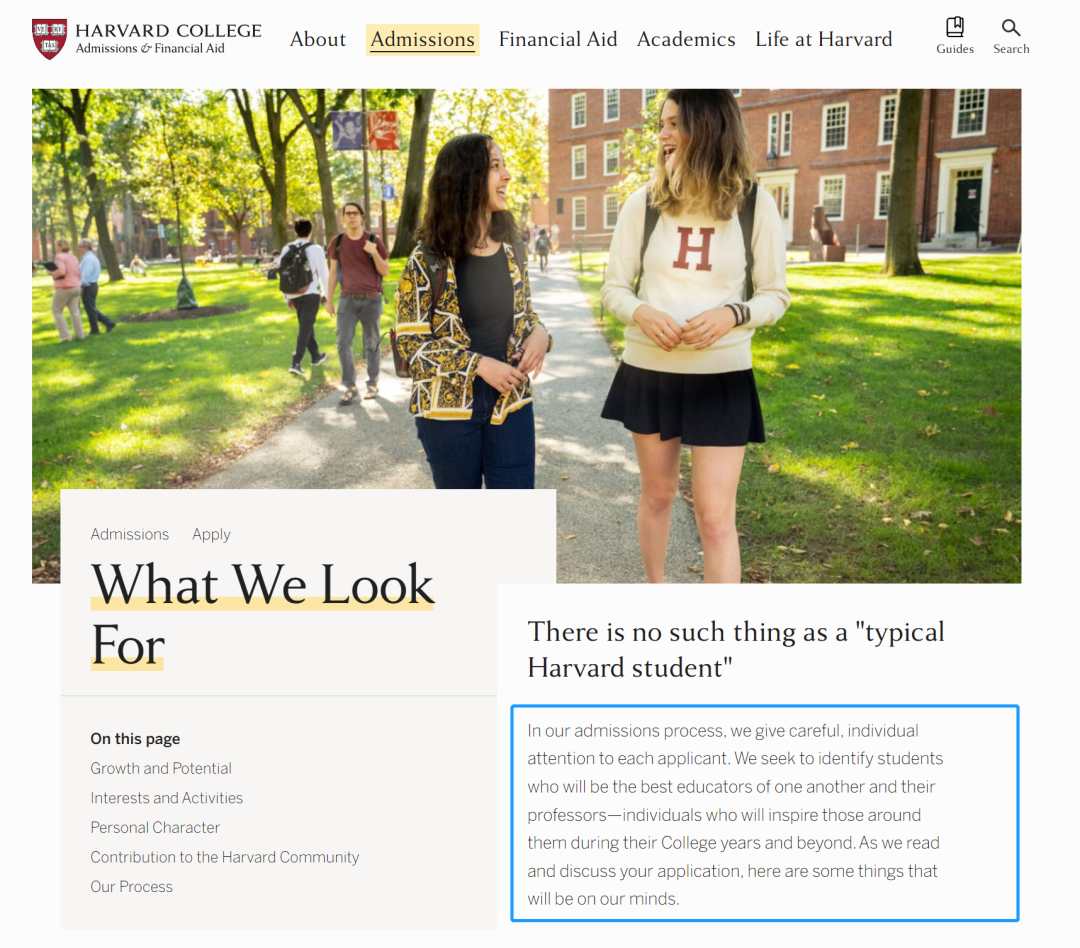
https://college.harvard.edu/admissions/apply/what-we-look
哈佛大学,重点看学生的影响力(influence)——你能否影响周围的人?能否愿意去改变世界上你认为值得改变和应该改变的事情?所以哈佛一定是希望找到能够改变世界的人。这个可不是口号。所以所谓“改变世界”的口号,不是马上就把这个世界改变了,而是在自己的小领域里,做一些有意义的事情。
In our admissions process, we give careful, individual attention to each applicant. We seek to identify students who will be the best educators of one another and their professors—individuals who will inspire those around them during their College years and beyond.
耶鲁大学
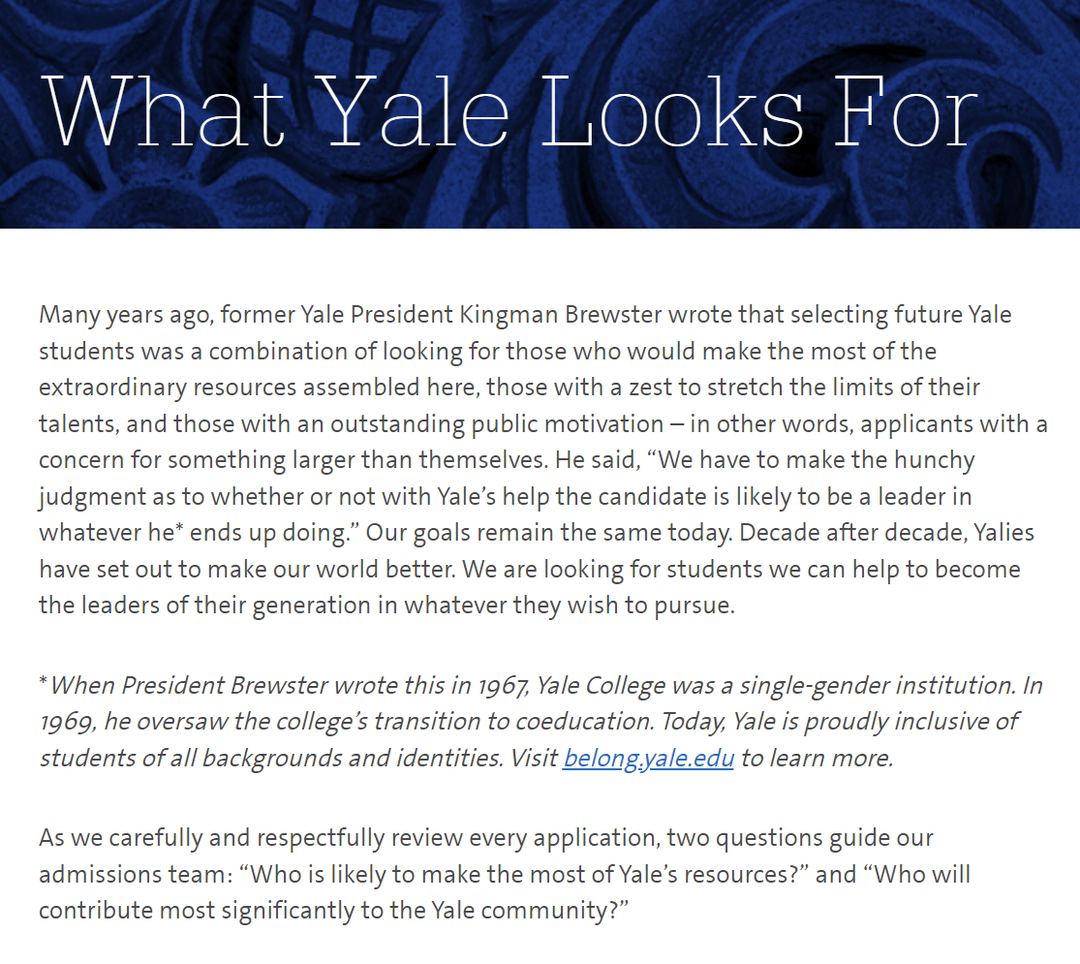
https://apply.mitadmissions.org/apply/
耶鲁大学的招生重点则是:push your limits(把自己推到极致)。耶鲁大学里有非常浩瀚的学习资源和机会,所以大学希望能找到可以把握住在校时的机会,能够最大化利用好这些资源的人。也就是说,如果你有某方面,或某些方面的兴趣,你一定要已经在这些方面把自己推到了极致。这才是耶鲁想要的人。
As we carefully and respectfully review every application, two questions guide our admissions team: “Who is likely to make the most of Yale’s resources?” and “Who will contribute most significantly to the Yale community?”
普林斯顿大学
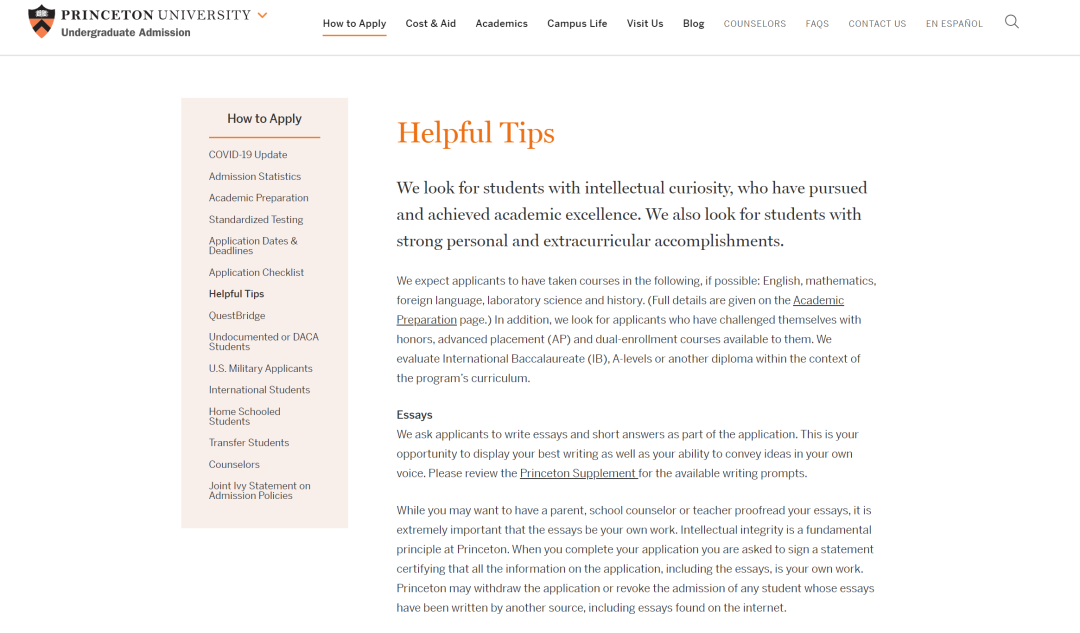
https://admission.princeton.edu/how-apply/helpful-tips
除了学术好奇,校内成绩出色是硬核要求,普林斯顿大学还希望寻找对学校和社区都有所作为的学生,这些一般会通过你的领导力活动、兴趣、特殊技能和其他课外活动来体现。普林斯顿大学的大多数学生在高中时都是学术杰出者,他们中的大多数人还将自己的精力和技能投入到课堂之外的重要方面,因此我们想知道你关心什么,你做了什么承诺,你为履行这些承诺做了哪些事情?
We look for students with intellectual curiosity, who have pursued and achieved academic excellence. We also look for students with strong personal and extracurricular accomplishments.
宾夕法尼亚大学
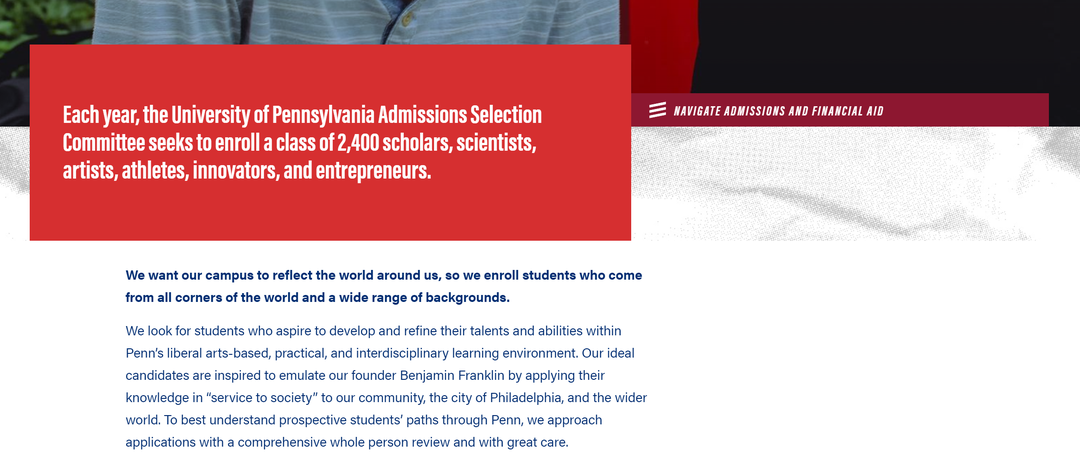
https://admissions.upenn.edu/admissions-and-financial-aid/what-penn-looks-for
宾夕法尼亚大学的重点是背景Diversity(多样性)——你的到来能给学校带来哪些多样性的东西?你独特的个性、经历、成就,都是学校会着重关注的。宾大法学院前任招生院长Derek Meeker就曾公开谈论过多样性在法学院申请录取过程中的角色,他指出,多样性对于法学院录取是很重要的。招生官们正在寻找有助于充实法学院群体多样性的经验和背景。总之,宾大不想要千篇一律的学生。
We want our campus to reflect the world around us, so we enroll students who come from all corners of the world and a wide range of backgrounds.
We look for students who aspire to develop and refine their talents and abilities within Penn’s liberal arts-based, practical, and interdisciplinary learning environment.
麻省理工学院
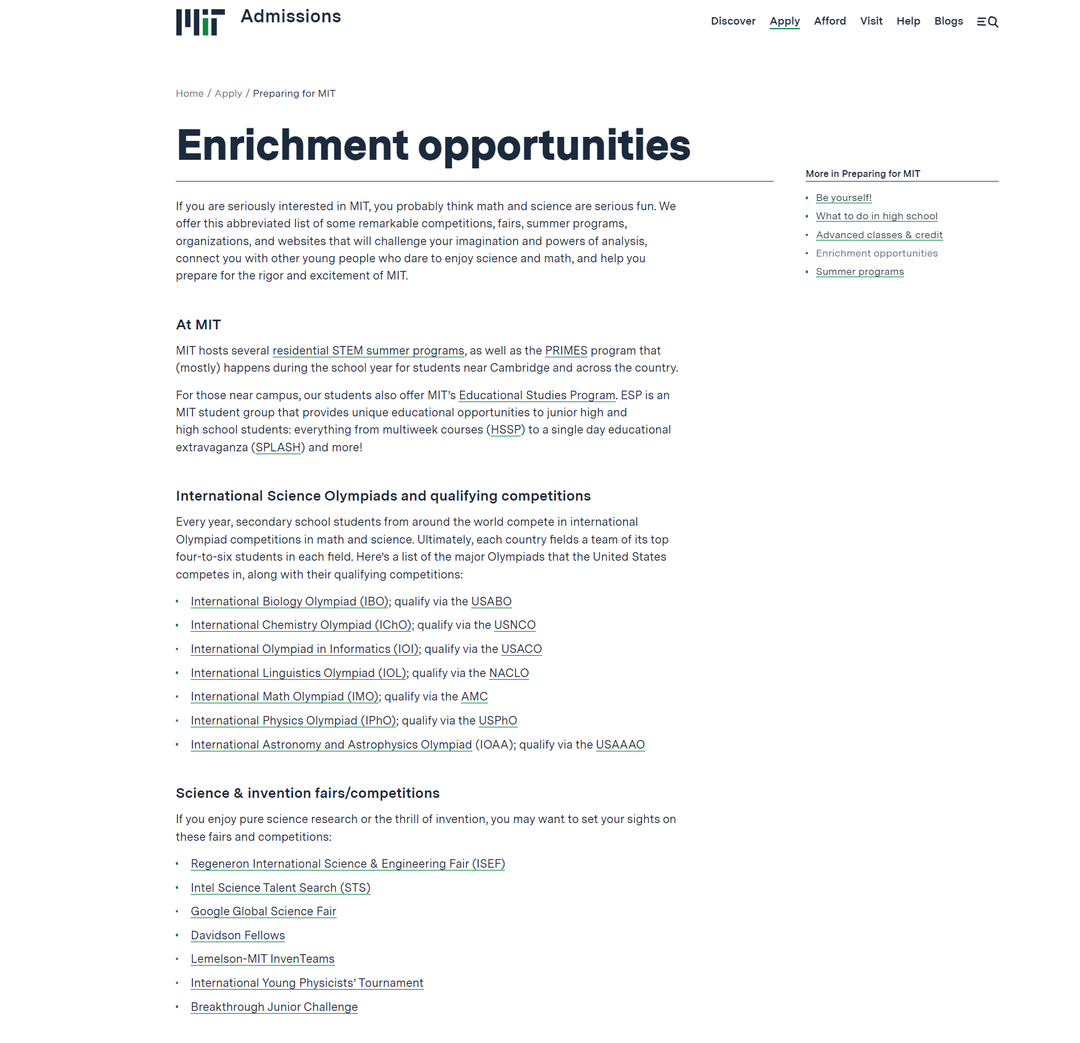
https://mitadmissions.org/apply/process/what-we-look-for/
MIT(麻省理工学院)则是在寻找对科研有执念、想在科研界做出成就的人。MIT的招生官网中,明确把自己偏爱的课外活动列表给大家列了出来,其实这就是一个非常直接的参考。
斯坦福大学
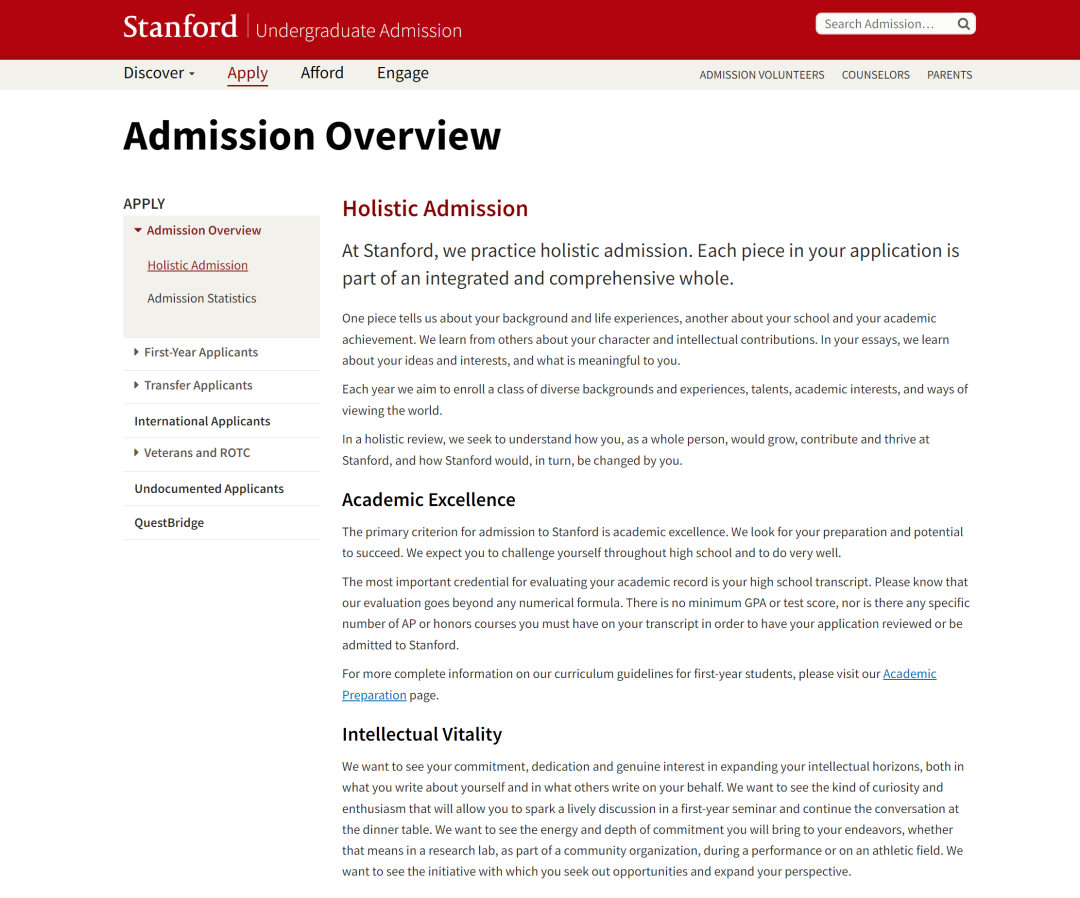 https://admission.stanford.edu/apply/overview/index.html
https://admission.stanford.edu/apply/overview/index.html
斯坦福大学除了成绩是硬指标。斯坦福大学的另外一个重点是Intellectual Vitality,也就是智识上的活跃度。对斯坦福来说,学生光有聪明是不够的,一定还要有智慧上的思想深度。
We want to see your commitment, dedication and genuine interest in expanding your intellectual horizons, both in what you write about yourself and in what others write on your behalf. We want to see the kind of curiosity and enthusiasm that will allow you to spark a lively discussion in a first-year seminar and continue the conversation at the dinner table. We want to see the energy and depth of commitment you will bring to your endeavors, whether that means in a research lab, as part of a community organization, during a performance or on an athletic field. We want to see the initiative with which you seek out opportunities and expand your perspective.




